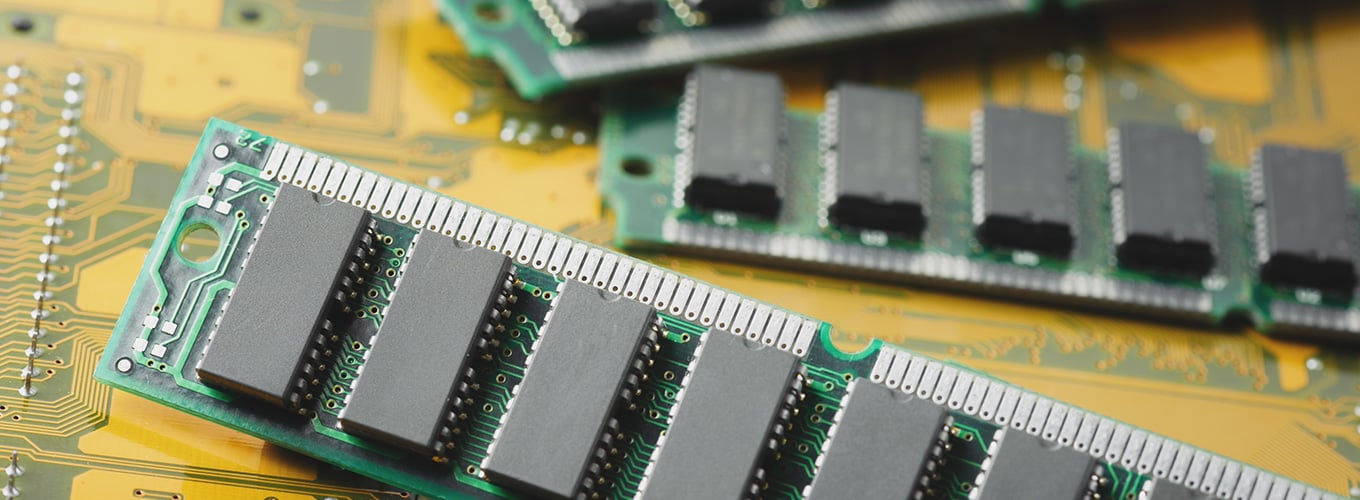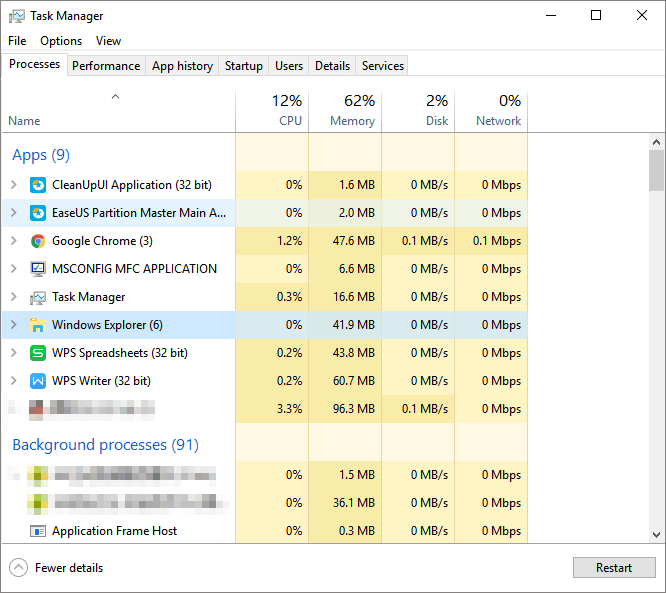Frustrated
Why RAM slow down your PC?

How we know RAM is slowing down our PC?
- Applications running slow: This is the first clue you get once you see the application running slow when you start.
- Application crash: Sometimes applications are not performing according to what they perform and showing erratic behaviour.
- Warnings: There are warnings when you open application,
pop-up box appears showing Not enough RAM, either extend or delete data. It means your RAM is full and you have to remove data from it or manage it.
A full hard disc with unnecessary files often results in a slow performance of your computer.This step will focus on an easy way to make sure that the computer is empty of unneeded files. I strongly recommend the software CCleaner to be used as it can simply clean your computer of unneeded files within several minutes time.
Let us start how you can easily speed up your PC by cleaning your RAM from Windows PC.
- So, whether you want to manage startup items, defrag your disk, clean Windows registry or do any task which potentially improves your PC’s speed, Boostspeed can do that in seconds. Basically, this is the only app that you need to keep your PC in the best possible shape.
- Delete unnecessary files from your computer The “Temp” and “Prefetch” folders on your laptop hold some unnecessary files that slow down your computer’s performance by taking up both memory and storage space. By cleaning up these folders, your laptop will run more efficiently thanks to less memory usage.
- Sometimes your computer becomes slow due to memory leaks or power surges. You can’t control such factors. But, if your computer is slowing due to RAM, then you can fix your computer. All you need to do is free up your computer RAM. Once you have cleared the memory, your computer will start working properly.
Modern family 1x01 spanish. Clean Windows PC RAM and Speed up Performance
There are many ways for clearing your Windows PC RAM, here we are suggesting you some of the best ways.
1.End unnecessary running programmes Download citi pond bryant park zip code free software.
There are many apps that are unnecessary running and consume
- Open Task Manager with Ctrl + Alt + Del keys.
- Go to Task Manager, open Processes tab and the list displaying all your running tasks.
- Here you see the usage according to CPU, Memory, Disk, and Network. Choose the tasks consuming high CPU percentage and click End Task.
You can select many tasks that are unnecessary running and after this, your CPU consumption becomes less and definitely the performance of your computer improves.
2. Uninstall the Apps/ Programmes
- Open Start menu and choose Settings.
- On the Settings menu, tap on System.
- Tap on Apps & features on the left side menu.
- Tap on the application and choose Uninstall option.
You can uninstall as many applications as you want. And the storage capacity increases and ultimately RAM which improves your PC speed.
3. Uninstall browser extensions
Extensions on your browser always help in performing your work efficiently but unnecessary extensions put a huge load on RAM and thus making your browser functions slow. Uninstall all the useless extensions and we have seprate topic for the best extensions that you must have in all different categories. Please check it out and only install those which really helps your daily routine work.
4. Close Unnessary applications
When you start your computer, many applications/ programmes automatically opened and start running. Close all the programmes. This will definitely improve your PC performance and quick loading in computer startup.
To disable automatic start up of programme follow below steps.
- Press Win+r and type below command in the field and press Enter key.
%AppData%RoamingMicrosoftWindowsStart MenuProgramsStartup Windows 2016 version history.
- Right-click on the programme that to don’t need to launch and select Delete option.
5. Use RAM cleaning software
- Download CleanMyPC and install it on your PC.
- Launch it after successful installation.
- Tap on Extensions check out the unnecessary extensions and remove them.
- Also, go to Autorun to check the applications or programmes running automatically on startup of your computer. Disable them from the button.
Recommended: CleanMyPC Latest Review
You can also clear all your cache, duplicate files that
For the readers who are looking for free alternatives, EaseUS Partition Master is a good choice. This software helps to remove useless programmes from PC in
You may also like:

You can follow us for more technical stuff on Facebook, Twitter or Google+
Like every operating system, Windows also stores different kinds of cache files on the hard drive. In simple words, cache files are temporary files that are stored on the memory to make it easier for you to access frequently used data. The cache data utilize lots of hard drive space of your computer. Deleting cache files is necessary for the smooth running of the system. Cache memory is responsible for various kinds of computer problems, including slow processing speed, slow startup, lag or hang, application responding, and many others. If you don't know how to clear memory cache on your Windows computer then, the solution to your problem is here. Here in this post, we will talk about How to clear memory cache on Windows computers.
5 Ways to Clear Memory Cache on Windows 10/8/7/Vista/XP
It is necessary to clear cache the memory to fully utilize your CPU power. Cache memory causes lots of problems by occupying a huge amount of computer RAM (Random Access Memory). That's why it is always recommended to clearing memory cache from your Windows computer to get optimum performance. Cache memory is something that is really useful to give you better performance. It helps the application to load faster as compared to load the app without cache data. Here below are some methods that will help you to clear memory cache in Windows 10/8/7/Vista/ and XP.
Method 1: Create Clear Memory Cache Shortcut
This is one of the easiest solutions to clear memory cache on the Windows operating system. This method is completely free; you don't have to install any third-party paid tool to clear the memory cache. Below are some steps to clear memory cache on Windows.
Step 1: First of all, you have to turn on your computer and right-click on the desktop.
Step 2: Here, you will have a couple of options. Click on 'Shortcut' under the New option.
Step 3: Create a Shortcut wizard will appear, you have to click Browse to locate the directory. Or you can simply type '%windir%system32rundll32.exe advapi32.dll, ProcessIdleTasks' without quotes on the text field of 'Type the location of the item'.
Step 4: Once the above process is completed, you have to click on 'Next' button to proceed to the next step.
Step 5: Now, you have to type a name for this shortcut. Here, we are typing 'Clear Unused RAM' and hit on the 'Next' button.
Once the shortcut is created, switch to the desktop and double-click on the shortcut to clear memory cache on Windows.
Method 2: Clear General Cache
Disk Cleanup is an integrated feature of Microsoft Windows that enables the user to clean unwanted files. Getting engaging with this feature, you can remove temporary files, unwanted files, preview windows installation files, and much more. You just have to choose the disk and start the deleting process. Here below are steps to clear the memory cache using disk cleanup.
Step 1: At the first step, you have to click on the 'Start' button and type 'disk cleanup' in the search field and hit the 'Enter' button.
Step 2: Now, Disk Cleanup: Drive Selection dialog box will appear. You have to choose the drive from where you would like to clear the memory cache.
Step 3: Now, click on the 'OK' button. It will start the scanning process and shows you how much space is occupied by the cache.
Step 4: You have to tick the checkbox which you would like to clean. If you want to clean system files then, you can click on the 'Clean up system files' otherwise, hit on the 'OK' button at the bottom of the window.

Step 5: Once the above process is completed, you can click on 'Delete Files' if prompted. It will start deleting cache files from places including recycling bin, Thumbnails, and many other places.
Method 3: Clear App Data File to Clear Memory Cache
Step 1: At the first step, you have to click on the 'Start' button or hit on the 'Windows' key and click on 'Computers' to open My Computer.

Step 2: My Computer window will appear; if you don't see My Computer, then manually type 'My Computer' in the start and hit the 'Enter' button.
Step 3: Once the above process is completed, you have to click on the 'Organize' tab in the top left corner of the window.
Step 4: Then, choose 'Folder and search options' under the organize drop-down menu.
Step 5: a Folder options dialog box will appear with 3 tabs; click on the view tab.
Step 6: Now, you have to click on 'Show Hidden files, folder, and drives' radio button under the 'Hidden files and folders'.
Step 7: Click on the 'OK' button at the button of the window.
Step 8: Once the above process is successfully completed, you have to open the hard disk where windows are installed.
Step 9: Now, you have to open the 'Users' folder by double-clicking on it. Then, click on the folder with an administrator account.
Step 10: You have to locate the 'AppData' folder and open it by double-clicking and open the 'Local' folder.
Step 11: Now, you have to select the 'Temp' folder and open it.
Step 12: Remove the read-only permissions from the Temp folder.
Step 13: You have to select all files that are placed in the Temp folder. You can press 'Ctrl' + 'A' to select all files.
Step 14: Once the files are selected, Press 'Shift' + 'Delete' button simultaneously to permanently delete all temp files.
Method 4: Delete Internet Explorer Files to Clear Memory Cache
Step 1: First of all, click on the 'Start' button and type 'Internet Explorer' in the text field and press the 'Enter' button.
Step 2: Internet Explorer web browser window will appear, you have to click on the 'General' tab at the top of the window.
Step 3: Now, you have to click on the 'Settings' under the browsing history section.
Step 4: Then, click on 'View files' at the screen's bottom right side. Once the above process is completed, a new window will appear with all cached files created by Internet Explorer.
Step 5: You have to press the 'Ctrl' + 'A' button simultaneously to select all the cache files.
Step 6: Now, you have to press the 'Shift' + 'Delete' button to remove all cached files permanently.
Method 5: Clear the DNS Cache
Step 1: Initially, you have to click on the 'Start' menu by clicking on the Start button at the bottom left of the screen.
Step 2: Now, type command prompt and hit the Enter button to launch. You can also open a command prompt by right click on Command prompt and run as administrator.
Step 3: On the command prompt, you have to type 'ipconfig /flushdns' without quotes and press the'Enter' button.
Step 4: You have to wait for a couple of seconds and be notified when completed. Once it is successfully completed, you have to restart your computer to makes changes.
How To Clean Your Computer Memory
